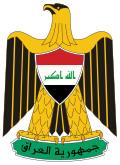- Iraqi Constitutional Monarchy
-
Iraq 
This article is part of the series:
Politics and government of
IraqGovernment- Constitution
- Federal government
- President (List)
- Presidency Council
- Vice Presidents
- Prime Minister (List)
- Cabinet
- Current Government
- Kurdistan Regional Government
Legislative- Council of Representatives
- Speaker
- Kurdistan Parliament
Judicial- Iraqi High Tribunal
- Governorates
- Districts
Elections- Elections
- Electoral Commission
- Jan 2005 parliamentary election
- 2005 governorate elections
- Dec 2005 parliamentary election
- 2009 governorate elections
- 2010 parliamentary election
- Constitutional referendum
Political PartiesForeign Policy
The Iraqi Constitutional Monarchy (ICM) is a monarchist political party in Iraq led by Sharif Ali Bin al-Hussein.
Al-Hussein is related to the Hashemite royal family which ruled Iraq until 1958. He has succeeded in establishing himself as claimant in the international press and currently (in the politics of Iraq) Prince Sharif Ali bin al-Hussein is the only Iraqi royal campaigning in Iraq for the return of a monarchy based on a constitutional monarchy.[1] Some critics assert he is not even in line to the throne according to the constitution of the old Iraqi monarchy (The Iraqi Constitution as amended in November 1943). According to this constitution, the heir to the monarchy would be Prince Ra'ad (born 1936), Lord Chamberlain of Jordan.
Contents
Goals of the Iraqi Constitutional Monarchy
- First: To uphold the unity of the Iraqi nation and to maintain its sovereign independence.
- Second: To affirm the Islamic identity of Iraq while respecting all religions and beliefs and recognizing their inviolable rights.
- Third: To implement a free and direct national referendum to decide the nature of government and the Head of State.
- Fourth: To draft a permanent Constitution to be confirmed by the people of Iraq in a free public referendum.
- Fifth: That the nature of the Monarchy will be hereditary and constitutional emanating from the will of the people and that the Monarch would be the symbol of the unity of the people and the pride and honor of the nation.
- Sixth: The establishment of a pluralistic democratic state in which power is transferred via the ballot box and the establishment of healthy democratic institutions on the basis of the complete separation of power between the executive legislative and judicial branches.
- Seventh: The affirmation of the sanctity of the judiciary and its independence from any group or person in the state.
- Eighth: To completely uphold the principals of Basic Human Rights as laid down by religion the United Nations and International Institutions.
- Ninth: That the armed forces belong to the people and that their sacred mission is to protect the nation from external aggression and are prohibited from any political activity.
- Tenth: To institute a free economy and encourage and develop the industrial agricultural and commercial sectors while maintaining a balance between the rights of ownership and the free market and the rights of the people to social justice equal opportunity and basic amenities.
- Eleventh: To implement a comprehensive national reconciliation based on forgiveness and absolution far from a desire for vengeance and retribution with due consideration for the rule of law and justice.
- Twelfth: To amend the legacy left by the dark era on the basis of just laws with foremost consideration for ethnic and secular issues, the nationality law, voluntary and forced emigration and on the foundation of equal rights and responsibilities for all citizens as stated in the permanent constitution.[2]
References
External links
See also
King of Iraq
Categories:- Political parties in Iraq
- Monarchist parties
- Asian political party stubs
- Iraq stubs
Wikimedia Foundation. 2010.
